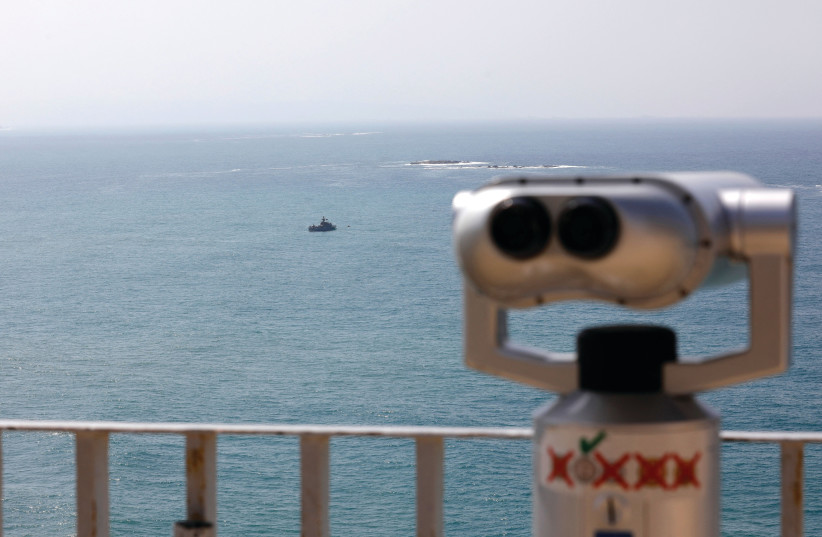US Energy Envoy Amos Hochstein sent a new draft of his proposed economic waters agreement between Israel and Lebanon as Israel began testing the gas rig at the Karish field near disputed waters with Lebanon on Sunday in a move that could escalate tensions between the countries.
Hochstein has continued his efforts to reach a deal between the countries after Israel accepted a draft last week, but Lebanon made additional demands that Israel rejected.
Jerusalem expects further negotiations over changes to the agreement in the coming days.
Lebanese President Michel Aoun expressed hope on Monday that negotiations will end soon.
“We hope to complete arrangements related to marking the southern maritime border [with Israel] within days,” Aoun said, according to Lebanese media. “The negotiations went a long way and the gaps were closed over the last week.”

Defense Minister Benny Gantz threatened to destroy Lebanon if Hezbollah attacked Israel, but struck an optimistic note about the pending maritime gas deal between Israel and Lebanon, saying it was still on the table and could be concluded “within days.”
“Negotiations are continuing,” Gantz said in interviews he gave on Friday.
Israel gave Energean—the Greek company licensed to pump the gas from Karish—the green light to start testing the pipeline on Sunday morning. The gas will be pumped from the land station to the sea-based rig to see that the pipe is operational.
Those tests are expected to last a month and if they go well, the rig could begin pumping gas from beneath the seabed within a few weeks.
Hezbollah, the Iranian-backed terrorist group that operates in Lebanon, warned Israel in recent months against putting the Karish gas field in service, and the IDF is prepared to respond harshly in such an instance.
“Israel is prepared to reach a deal, but it is also determined to preserve its security and economic interests. In light of this, I have instructed the IDF to be prepared for an escalation that does not necessarily need to occur,” Gantz said in the interviews aired on Saturday night.
Gantz said that he had placed the IDF on high readiness in terms of intelligence, offensive, and defensive operations in the north.
“If Hezbollah will make this mistake and attack Israel, in any way – by land, sea, or air – Israel will protect itself, attack them and if it turns into something wider, we will destroy Lebanon,” he warned.
Hochstein’s draft from last week would have had Israel concede the entire triangle of economic waters that had been in dispute with Lebanon in 2012-2021, up to what is known as line 23, but not the extended triangle that Lebanon demanded in early 2021, known as line 29. It would, however, allow Lebanon to develop the entire Kana Field that extends beyond line 23.
In addition, Israel would receive royalties by the percentage of the Kana reservoir that is in its waters, in accordance with a separate deal being negotiated with a gas consortium led by French energy company Total, which has the Lebanese license to extract gas from the field. The deal would allow Total to start work in the gas field as soon as the deal is signed.
Lebanon demanded that Israel receive a buyout of its portion of the Kana field, rather than get royalties from gas sales.
The deal also included international recognition of the “buoys line,” an obstacle extending 5 km. into the sea from Rosh Hanikra, on the border with Lebanon. Jerusalem has argued the line was vulnerable because Israel had established it unilaterally as a zone necessary for the Jewish state to have freedom of action for its security, and the agreement with Lebanon will anchor that line in international law.
Beirut, however, sought to change the language that would make the buoy line part of the border.
Benjamin Netanyahu's reaction to the deal
“They [Lapid and Gantz] are transferring Israel's strategic assets to Hezbollah at clearance prices.”
MK Benjamin Netanyahu (Likud)
Opposition leader Benjamin Netanyahu said that “Lapid and Gantz went behind the backs of the citizens of Israel and the Knesset and surrendered to Hezbollah’s blackmail.”
“They are transferring Israel’s strategic assets to Hezbollah at clearance prices,” Netanyahu said. “Hezbollah will use the billions from the gas to arm itself with missiles and rockets against the citizens of Israel and Iran will set itself up across from Rosh Hanikra and Israel’s gas reservoirs.”
Netanyahu said that “the weak and amateurish interim government does not have a mandate to make such a dangerous decision in the dark, days before the election” on November 1.
